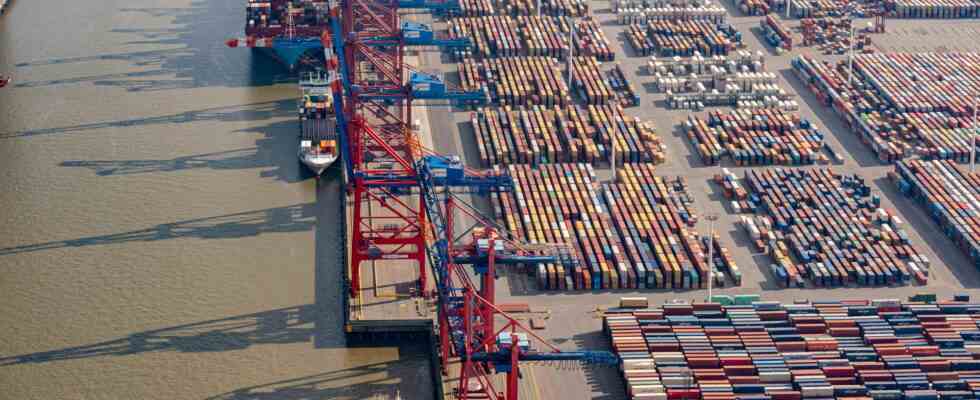Exclusive
Status: 04/22/2022 09:49 a.m
Cargo ships are piling up in front of many ports around the world – increasingly in Germany too. Pandemic and war have brought disorder to the global flow of goods.
Dozens of cargo ships that want to dock in Bremerhaven or Hamburg are bobbing along the North Sea coast, but are doomed to wait for days and now even weeks. Tiefwasserreede is the technical term for patience at sea.
Staff asked to work overtime
Eight of the waiting ships alone want to go to Hamburg’s Burchardkei, one of four container terminals in Germany’s largest port. A letter from the management of the terminal to the staff, which dem NDR is available, gives an idea of the extent of the disruption. “We want these ships to dock with us,” write the two terminal bosses, looking at the freighters waiting out in the North Sea. They complain about an “extremely tense operational situation in our company” and ask the employees to work overtime and not to take days off. “We need about 800 additional shifts a month to break the cycle of waiting ships and to cope with the container avalanche.”
The management of Burchardkai, which belongs to the Hamburg port logistics group HHLA, offers employees concrete financial incentives for overtime work, around 100 euros in addition to the normal wage for not taking a day off and 50 euros extra for four hours of overtime. The manager’s persuasion ends with the words: “For questions and answers, we invite you to a coffee this week between shifts.”
The works council has not yet approved the offer. “Negotiations are still ongoing,” said an HHLA spokesman when asked NDR With. In any case, the request for overtime seems somewhat paradoxical in view of HHLA’s other efforts to reduce the workforce on the quays and to increase automation.
The containers are stacked on the quays
In fact, things are stagnating at Burchardkai. The “Ever Given” is symbolically located at the middle of the three berths. The container ship got stuck in the Suez Canal in March 2021, blocking the waterway for six days. Now the port of Hamburg cannot keep up with handling the cargo. This is mainly due to the increasing number of containers that have to be temporarily stored in the port. Although HHLA has created new parking spaces, there is still a lack of space – and apparently of staff – to move the “avalanche”.
“Burchardkai mainly handles Far East services. That’s where we have the greatest impact,” says HHLA board member Jens Hansen, who is responsible for operational business, in an interview with the NDR. “At the moment there is still a waiting position. We are in talks with our customers.”
Is the worst yet to come?
As HHLA’s board of directors scrambles to spread hope that the chaos will be cleaned up soon, independent experts are warning that the worst is yet to come. “The situation will drastically worsen over the next few weeks,” predicts Jan Ninnemann, a professor at the Hamburg School of Business Administration. The economist, who specializes in logistics management, refers to the traffic jam in Shanghai, the largest port in the world, where more than five times as many containers are handled as in Hamburg. At the moment, Shanghai is not in step, mainly because of the corona lockdown. But then suddenly a lot of ships will be making their way to Europe at once, Ninnemann expects: “Then we’ll have the big wave here. The traffic jams will then be even longer.”
The situation with regard to the container freighters waiting in the German Bight is already critical. “With operating costs of $50,000 a day, you can literally see the dollar bills flying down the chimneys,” comments the economics professor. The economic losers are neither the shipowners nor the terminal operators. Both even make high profits: the shipping companies, because they have increased freight rates enormously, and the terminal operators, because they collect hefty fees for storing the containers. The exploding costs are passed on to the recipients of the goods: companies and consumers. The chaos in the ports fuels inflation.
Container jam in front of Germany’s largest port
Jennifer Johnston, NDR, April 22, 2022 9:22 a.m

